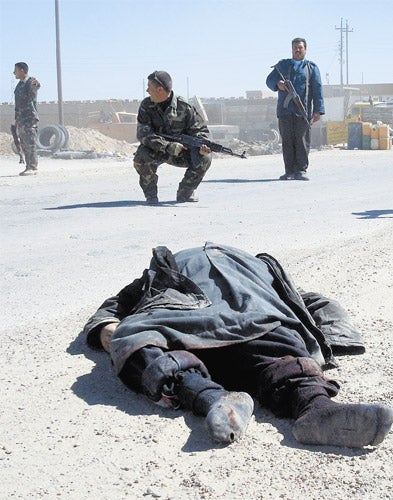US troops ask Syria to thwart al-Qa'ida offensive
Iraqi authorities say militants will launch attacks in order to claim credit for American military withdrawal

The Iraqi government expects al-Qa'ida and Baathist insurgent groups to launch a wave of attacks so they can take credit for compelling the US military to leave Iraqi cities by 30 June, according to a senior Iraqi minister.
An American military team was dispatched from Baghdad to Damascus at the weekend to demand that Syria help choke off a guerrilla offensive by imposing greater control over its border with Iraq, Iraqi Foreign Minister Hoshyar Zebari revealed in an interview with The Independent.
"I think the American rapprochement with the Syrians will be judged more by their co-operation, not in Lebanon, but in Iraq," said Mr Zebari. "This is a good moment for them to come clean." Although Syria has been more co-operative with Iraq than in the past, guerrilla fighters are still crossing over the border, he added.
The top US military commander in Iraq, General Ray Odierno, confirmed this week that the American military withdrawal from Iraqi cities would take place as agreed under the Status of Forces Agreement (Sofa) negotiated last year. Some 133,000 US troops will remain in Iraq but the knowledge that they too will be withdrawn by the end of 2011 makes Iraq a more tempting target for neighbouring states seeking to expand their influence within the country.
"The purpose of the US military team going to Damascus is to urge Syria to do more to prevent foreign fighters from coming here," said Mr Zebari. "According to our intelligence analysis al-Qa'ida, the Baathists and all armed groups will escalate the violence just to prove that they have won a victory.
"They want to say it was the sons of the resistance, not Prime Minister Nouri al-Maliki or the Iraqi government's agreement with the Americans, that forced them out of the cities."
Most of the foreign fighters coming through Syria into Iraq serve as suicide bombers. Al-Qa'ida in Iraq is clearly much weaker than it was at the height of its power in 2006 when it overplayed its hand by declaring its own Islamic State of Iraq and sought to become the ruling power in all Sunni Arab areas. This sparked a US-financed tribal backlash against al-Qa'ida. Sunni insurgents saw their community losing a savage sectarian war, provoked by al-Qa'ida, to the Shia and switched sides, allying themselves with the Americans.
"Al-Qa'ida has in fact been defeated," Mr Zebari said. "They have to gather all their forces to make one or two attacks but that is all."
The Iraqi Foreign Minister said he was not greatly surprised by the re-election of Iranian President Mahmoud Ahmadinejad whom he knows well. But the outcome of the Iranian election, if confirmed, means that Iraq will continue to face relentless pressure from the east to become a permanent part of the Iranian sphere of influence.
Iraq is the victim not only of present wars but the legacy of past ones. Mr Zebari, despite having to spend several days in a London hospital because of a sudden bout of ill-health, has been trying to defuse a crisis with Kuwait. This began to erupt when Iraq tried to free itself from UN Security Council sanctions. The most onerous of these sanctions have to do with Kuwait, which still gets 5 per cent of Iraq's oil revenues in compensation for the damage caused by Saddam Hussein's invasion in 1990.
Other points at issue include the fate of missing Kuwaitis, the return of looted Kuwaiti property, defining the border between the two countries and the joint ownership of the Rumaila oilfield that straddles the frontier.
Iraq has persuaded almost all the world that these sanctions should be dropped, though Mr Zebari insists that Kuwait's claims would not be affected. He did say, however, that Kuwait should reduce the proportion of Iraqi oil revenue it receives. "It is too much," he declared. "When Iraqi oil was selling at $140 a barrel it was a huge amount of money."
Iraqi efforts to escape UN Security Council tutelage led the Kuwaitis to launch a diplomatic counter-offensive, sending envoys to all key capitals. Iraqi MPs reacted by abusing Kuwait, some even suggesting that Kuwait should pay for the devastation caused by the American army which invaded Iraq from Kuwaiti territory in 2003. Mr Zebari said he could understand that Kuwait was worried that future less friendly Iraqi governments may revoke present agreements because Iraq as a country has not taken its final shape.
Iraq's Foreign Minister: An Essex graduate
Hoshyar Zebari, a 56-year-old from Aqrah in northern Iraq, has been the country's skilful and tireless Foreign Minister since 2003. The former Kurdish militant studied sociology at Essex University. An able propagandist and diplomat Mr Zebari became a senior member of the Kurdistan Democratic Party during its guerrilla war against Saddam Hussein in the 1980s and in the 1990s when the Kurds controlled their own territory.
As Iraq's Foreign Minister after the fall of Saddam Hussein he was confronted with neighbouring countries that were not on friendly terms with the new regime or wished it to survive. Some denounced the Iraqi government as a US puppet, others as an Iranian stooge. A tough, energetic but amiable negotiator, he has become expert at asserting Iraq's independence in the face of many threats and defusing conflicts with hostile neighbours. He says that he has not had "a single day's holiday" since he took the job six years ago.
Subscribe to Independent Premium to bookmark this article
Want to bookmark your favourite articles and stories to read or reference later? Start your Independent Premium subscription today.

Join our commenting forum
Join thought-provoking conversations, follow other Independent readers and see their replies